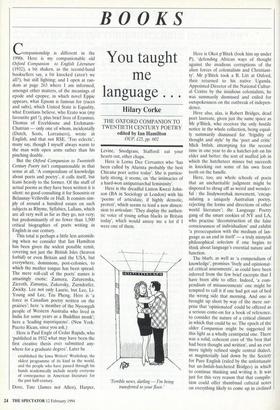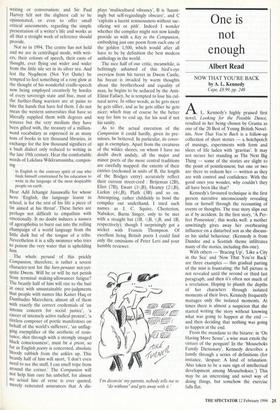BOOKS
You taught me
language . •
Hilary Corke
THE OXFORD COMPANION TO TWENTIETH CENTURY POETRY edited by Ian Hamilton OUP, £25, pp. 602 Companionship is different in the 1990s. Here is my companionable old Oxford Companion to English Literature (1932), a bit shaken, as the second-hand booksellers say, a bit knocked (aren't we all?), but still fighting; and I open at ran- dom at page 263 where I am informed, amongst other matters, of the meanings of epode and epopee, in which novel Eppie appears, what Epsom is famous for (races and salts), which United State is Equality, what Erastians believe, who Erato was (my favourite girl !), plus brief lives of Erasmus, Thomas of Erceldoune and Erckmann- Chatrian — only one of whom, incidentally (Dutch, Scots, Lorrainers), wrote in English, and that not RSE. 'Too eclectic', many say, though I myself always warm to the man with open arms rather than his pinching double.
But the Oxford Companion to Twentieth Century Poetry isn't companionable in that sense at all. 'A compendium of knowledge about poets and poetry', it calls itself, but leans heavily to the former. Of the stuff of actual poems as they have been written it is silent: no good consulting it for Sosostris or Belaunay-Velleville or Hull. It consists sim- ply of around a hundred essays on such subjects as Rhyme, Syllabics, Lallans, which are all very well as far as they go, not very; but predominantly of no fewer than 1,500 critical biographies of poets writing in English in our century.
This total is perhaps a little less astonish- ing when we consider that Ian Hamilton has been given the widest possible remit, covering not just the British Isles (heaven forbid) or even Britain and the USA, but everywhere, dominions, post-colonies, to which the mother tongue has been spread. The mere roll-call of the poets' names is amazingly exotic: Zamora, Zaturenska, Zieroth, Zimunya, Zukovsky, Zurndorfer, Zwicky. Lee not only Laurie, but Lee, Li- Young and Lee, Tzu Pheng. Here is 'a force in Canadian poetry written on the prairies'; here `a member of the Nyoongah people of Western Australia who lived in India for some years as a Buddhist monk'; here a `leading nuyoriqueno'. (New York- Puerto Rican, since you ask.).
Here is Paul Engle of Cedar Rapids, who `published in 1932 what may have been the first creative thesis ever submitted any- where for a graduate degree'. Later he
established the Iowa Writers' Workshop, the oldest programme of its kind in the world, and the people who have passed through his hands academically include nearly everyone of consequence in American literature for the past half-century.
Dove, Tate (James not Allen), Harper, Levine, Snodgrass, Stafford: eat your hearts out, other chaps.
Here is Lorna Dee Cervantes who 'has been called by Alurista probably the best Chicana poet active today'. She is particu- larly strong, it seems, on `the intimacies of a hard-won antipatriarchal femininity'.
Here is the dreadful Linton Kwezi John- son (BA in Sociology at London) with his `poems of articulate, if highly demotic, protest', which seems to lend a new dimen- sion to articulate. `They display the authen- tic voice of young urban blacks in Britain today', which would annoy me a lot if I were one of them.
'Terrible news, darling — I'm being transferred to your floor.' Here is Okot p'Bitek (look him up under P), 'defending African ways of thought against the insidious corruptions of the alien forces of colonialism and Christiani- ty'. Mr p'Bitek took a B. Litt at Oxford, then returned to his native Uganda. Appointed Director of the National Cultur- al Centre by the insidious colonialists, he was summarily dismissed and exiled for outspokenness on the outbreak of indepen- dence.
Here also, alas, is Robert Bridges, dead poet laureate, given just the same space as Mr p'Bitek, who receives the only hostile notice in the whole collection, being equal- ly summarily dismissed for `frigidity of thought and style' by the `poet and critic' Mick Imlah, attempting for the second time in one year to do a hatchet-job on his elder and better; the sort of muffed job in which the hatcheteer misses but succeeds in knocking out some of his own front teeth on the handle.
Here, too, are whole schools of poets that an uncharitable judgment might be disposed to shrug off as weird and wonder- ful : the Jindyworobak movement, 'encap- sulating a uniquely Australian poetry, rejecting the forms and directions of other world literature'; the Language Poetry gang of the smart cookies of NY and LA, who practise 'deconstruction of the false consciousness of individualism' and exhibit `a preoccupation with the medium of lan- guage as an end in itself — a truly ninnyish philosophical solecism if one begins to think about language's essential nature and function.
The blurb, as well as 'a compendium of knowledge', promises `lively and opinionat- ed critical assessments', as could have been inferred from the few brief excerpts that I have been able to offer. Indeed, `a com- pendium of misassessments' one might be tempted to call it if one had got out of bed the wrong side that morning. And one is brought up short by way of the mere sur- prise that `opinionated' could be offered as a serious come-on for a book of reference, to consider the nature of a critical climate in which that could be so. The epoch of the older Companion might be suggested in this light as a wholly centripetal one. There was a solid, coherent core of `the best that had been thought and written', and an ever more tightly refined single central dialect, as magisterially laid down by the Society for Pure English (ruled by the unfortunate but un-Imlah-hatcheted Bridges) in which to continue thinking and writing it. It was just for this very reason that that compila- tion could offer thumbnail cultural notes on everything likely to come up in civilised writing or conversation; and Sir Paul Harvey felt not the slightest call to be opinionated, or even to offer small critical assessments, regarding the simple presentation of a writer's life and works as all that a straight work of reference should provide.
Not so in 1994. The centre has not held and we are in centrifugal mode, with writ- ers, their colours of speech, their casts of thought, ever flying out wider and wider from the little isle set in its silver sea. And lest the Nyqdwem (Not Yet Quite) be tempted to feel something of a rosy glow at the thought of his wonderful cradle-speech now being employed creatively by hordes of every sovereign state and hue, most of the further-flung warriors are at pains to bite the hands that have fed them. I do not mean the western universities that have so liberally supplied them with degrees and tenures but the very medium they have been gifted with, the treasury of a million- word vocabulary as expressed in as many tons of books in ten thousand libraries, in exchange for the few thousand signifiers of a bush dialect only reduced to writing in the late 19th century. Hear the comfortable words of Lakdasa Wikkramasinha, compos- ing
in English in the contrary spirit of one who finds himself constrained by his education to write in the language of the most despicable people on earth.
Hear Adil Jehangir Jussawalla for whose hero 'English, the language learnt in school, is for the rest of his life a piece of tin aimed at his throat'. These furies are perhaps not difficult to empathise with emotionally. It no doubt induces a nausea of agoraphobia to burst out into the rolling champaign of a world language from the little dark but of the tongue of a tribe. Nevertheless it is a silly swimmer who tries to poison the very water that is upholding him.
The whole perusal of this prickly Companion, therefore, is rather a severe character-test for the bien-pensant not-yet-
quite Dwem. Will he or will he not perish from terminal making-allowances fatigue? The beastly half of him will rise to the bait at once with unsustainable pre-judgments that people with names like Kaiser Haq or Dambudzo Marechera, almost all of them with exactly the correct credentials of 'an intense concern for social justice', 'a career of intensely active radical protest', 'a tireless composer of poetic manifestoes on behalf of the world's sufferers', 'an unflag- ging exemplifier of the aesthetic of resis-
tance, shot through with a strongly imaged black consciousness', must be a priori, so far as English poetry is concerned, absolute
bloody rubbish from the ankles up. This beastly half of him will snort, 'I don't even need to see the stuff, I can smell tripe from
around the corner.' The Companion will not help him cure his unbelief, for almost no actual line of verse is ever quoted, merely reiterated assurances that A dis- plays 'multicultural vibrancy', B is 'haunt- ingly but self-regardingly obscure', and C `exploits a lucent sensuousness without sac- rificing wit or pith'. Indeed I wonder whether the compiler might not now kindly provide us with a Key to the Companion, embodying just one poem from each one of the golden 1,500, which would after all have to be by definition the best modern anthology in the world.
The nice half of our critic, meanwhile, is befittingly ashamed of this bird's-eye overview from his turret in Dwem Castle, his breast is invaded by warm thoughts about the brotherhood and equality of man, he begins to be seduced by the Anti- Elitist Fallacy, he is tempted to lose his cul- tural nerve. In other words, as he gets nicer he gets sillier, and as he gets sillier he gets nicer; which may of course be the better way for him to end up, for his soul if not his sanity.
As to the actual execution of the Companion it could hardly, given its pre- misses, be bettered. In particular, its cover- age is exemplary. Apart from the creatures of the wilder shores, on whom I have no doubt dwelt unduly, all the major and minor poets of the more central traditions are carefully mapped: the extents of their entries (reckoned in units of B, the length of the Bridges entry) accurately reflect their current street-cred : Betjeman (2B), Eliot (7B), Ewart (1',2B), Heaney (21/2B), Larkin (41/2B), Plath (3B) and so on. Attempting, rather childishly to bowl the compiler out underhand, I tried such names as J. C. Squire, Chesterton, Nabokov, Burns Singer, only to be met with a straight bat (1B, '/2B, '/2B, and 1B, respectively); though I surprisingly got a wicket with Francis Thompson. Of excellent living British poets I could find only the omissions of Peter Levi and your humble reviewer.
`I'm divorcin' my parents, nobody tells me to "do without" and gets away with it.'



















































 Previous page
Previous page